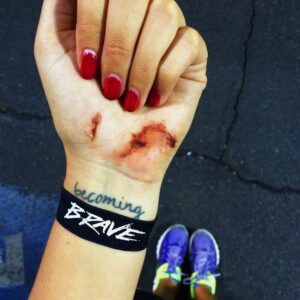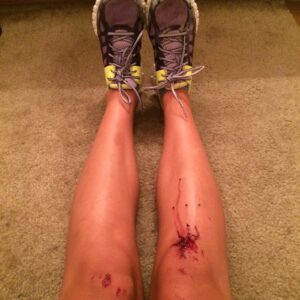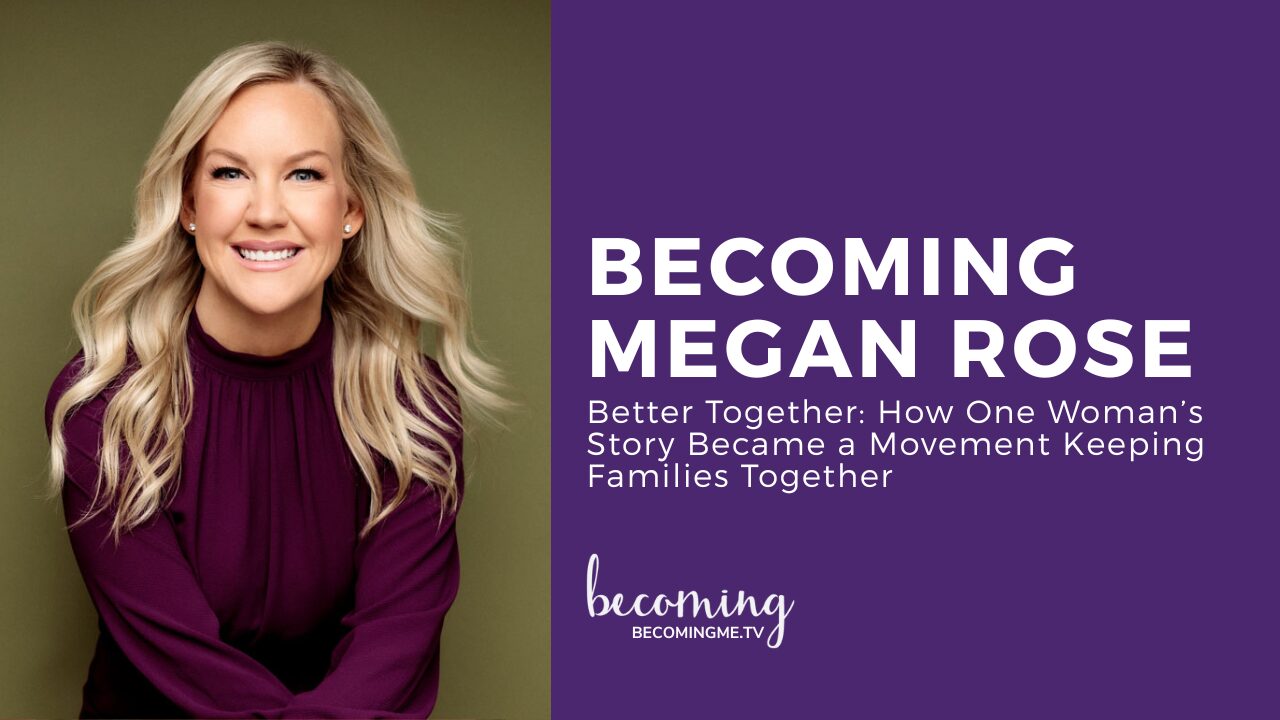It was the perfect Fall Tuesday night in Vegas. A sweet breeze rippled across the desert mountains just beckoning me to go for a night run. I texted my running partner, we quickly laced up our running shoes, and met at our favorite running spot.
This wasn’t our first run at this particular park. In fact, this was our usual meeting place. We knew the course well and knew how to navigate the trail in the dark. We soon found a sweet rhythm and fell into comfortable conversation. Along the way, the light posts on the trail grew dim. To shed light on the rocky path in front of us, I flipped on my phone flashlight so we wouldn’t miss a beat.
Splat!

 In a split-second, my body hit the ground and skidded across the rocks. My right hand gripped my phone while my left hand tried to halt my forward velocity. Finally, I pushed myself to my feet and started running again. My running partner quickly asked if I was okay, and I prompted us to simply continue on the trail. Feeling virtually no instant pain, I began thinking everything was probably alright.
In a split-second, my body hit the ground and skidded across the rocks. My right hand gripped my phone while my left hand tried to halt my forward velocity. Finally, I pushed myself to my feet and started running again. My running partner quickly asked if I was okay, and I prompted us to simply continue on the trail. Feeling virtually no instant pain, I began thinking everything was probably alright.
And then I felt the blood trickling down into the crevices of my socks by my ankles. Trying to shake it off, I kept running until the pain began pounding like a constant, annoying knock on your front door while you’re trying to take a nap. Constant, pounding, aching.
We ran to the nearest light post and I instantly saw that my knees and hands were not okay. Raw skin hung off my legs and blood oozed out of my open wounds. We finished running, I poured water down my legs and picked up bandages from the nearest store. Gingerly cleaning my bloody knees, I carefully tried to remove dirt and find a comfortable way to sleep through the night without agitating my wounds.
The next day, I grabbed a handful of bandages and knew jeans weren’t an option. My legs wouldn’t stop bleeding so I sported a skirt for work, bandaged my knees and went on my way. As I drove to the office, I called my Dad to talk through the events of the night. He asked a slew of questions and shared something that would later impact me on a much deeper level than my oozing, wounded knees.
He said, “Emily, you need to go home, turn on your shower head to the hardest setting it will operate on and you need to scrub your wounds. You need to clean out the excess rocks and dirt. Baby, it’s going to hurt. It’s going to sting and it’s not going to be fun. But if you don’t do this, you could get an infection and then a doctor would have to open your closed wounds and scrape out the debris. Take the time to thoroughly clean out your wounds.”
I listened. I turned my car around and took the most painful shower I’ve ever experienced in my life. But as I stepped out of the pain, out of that shower, I knew my Dad was right. If I wouldn’t have taken the time to really clean my wounds, I would have found a much bigger problem down the road.
Break ups feel like bloody knee moments in life—one moment your relationship is moving forward and then splat!, in the next moment you feel the immediate force of a complete break, and find yourself assessing the damage.
We don’t walk into dating relationships already anticipating breaking up. We say yes to that date and the next and the next because we love doing life with that person, and can’t imagine our story without them written in it. Whether you find yourself doing the breaking up or being broken up with, the shock still stings. You wake up the next day, fingers twitching to text that familiar character, and achingly realize they’re not written into your story anymore. Relational break ups hurt, they leave a mark. They leave our emotions bloodied and bruised, dirt and debris clinging to the chambers of our hearts. We attempt to dust ourselves off, bandage our wounds, do everything in our power to stop the bleeding, and gradually watch the gnarly wreckage build up inside of us.
But here’s the thing—it’s not our wounds that define us; it’s what we do after we’re wounded that matters. In leaving debris in the wreckage of my pain, I only make my wound worse—I don’t allow myself to actually heal from my relational break up. I’m simply masking an open wound, pretending everything is okay, when in reality, it’s not. How I choose to clean out my wounded heart matters.
In the midst of the healing process, how can we scrub and clean out our wounds?
- Identify your pain. Grab a journal or a trusted friend and name your pain. Walk through the break up.
- Ask questions. How did it make you feel? Why did it make you feel that way? Work through the deep, gritty places to identify the root of your pain. We can’t clean out our wounds if we don’t know where they are. Take the time to identify the core issues so you can discover lasting healing.
- Clean house.What physical reminders do you have from the person, place, circumstance or situation that left you with bloody knees? Delete text messages, emails and Facebook messages; throw away letters; pack up a box of clothes or tokens and take it to a thrift store; throw away and delete photos. To heal, we must remove the dirt, the grime, the muck, the hurt. I get it, this may seem harsh, but warrior friend…I’ve been here. You can’t heal without cleaning out your wound.
- Give yourself time. Just like physical wounds take time to heal, our hearts also need time to heal. Initially, we’ll make it through the steps of identifying pain, asking the tough questions and cleaning house, and will still feel the sting of the pain. That’s normal. It’s a part of the healing process. Healing will hurt, but it leaves you stronger. We can never undo what has been done to us, but we are never broken, only bruised.
- Stand your ground. It would be silly for me to thoroughly clean out my bloody knees, allow them to heal, and then cut them back open…right? The same is true with the pain we experience in life. After taking the time to truly heal, don’t cut your wounds back open. Don’t go back to places of pain, places of hurt.
My knees and hands are know adorned with some pretty gnarly scars from that eventful Fall night. But you know what? Those bumpy, rough patches of skin don’t make me grimace like they used to. They aren’t causing physical pain. They’re simply there, a part of me, a part of who I’m becoming.
The same is true for those places of healing in my heart. I have scars from broken relationships, unmet expectations, betrayed trust, disappointment, shame, unhealthy decisions, and rejection. But those scars are simply scars. They aren’t oozing pain anymore because I scrubbed my wounds, I cleaned out my heart from the muck that was fighting to take up permanent residence inside. Fighting for healing became one of the sweetest gifts on my becoming journey.
My scars don’t define me. My scars don’t dictate my future; they simply remind me of God’s presence in the storm and His promise to never leave me or forsake me. My scars remind me of the incredible hope I have in Jesus. They leave me so thankful for a Savior whose body was beaten, bruised and ridden with scars born out of deep, abiding, never-changing love for me. My scars remind me of love, of acceptance, of the truth that I have not been rejected. My scars remind me of truth.
Warrior friend, the pain you’re feeling doesn’t define you or your becoming story. It’s just a chapter. But don’t stay stuck in this chapter. Pick yourself up, lace up your warrior boots and do the hard work…the warrior work. Clean out the deepest points of your hurt and fix your eyes unwaveringly on the hope we have in Christ. This one break up…it doesn’t define you. Perhaps it’s God’s sweetest gift, protecting you for His very best for you that you just haven’t met yet.

